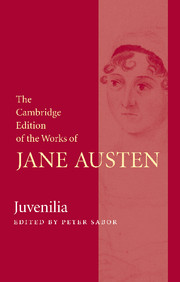Book contents
- Frontmatter
- Contents
- General editor’s preface
- Acknowledgements
- Chronology
- Introduction
- Note on the text
- Volume the First
- Volume the Second
- Volume the Third
- Corrections and emendations
- Appendix A The History of England: facsimile
- Appendix B Marginalia in Oliver Goldsmith’s The History of England, from the Earliest Times to the Death of George II
- Appendix C Marginalia in Vicesimus Knox’s Elegant Extracts . . . in Prose
- Appendix D Sophia Sentiment’s letter in The Loiterer, 28 March 1789
- Appendix E Continuations of ‘Evelyn’ and ‘Catharine’ by James Edward Austen and Anna Lefroy
- Abbreviations
- Explanatory Notes
The History of England
Published online by Cambridge University Press: 18 December 2020
- Frontmatter
- Contents
- General editor’s preface
- Acknowledgements
- Chronology
- Introduction
- Note on the text
- Volume the First
- Volume the Second
- Volume the Third
- Corrections and emendations
- Appendix A The History of England: facsimile
- Appendix B Marginalia in Oliver Goldsmith’s The History of England, from the Earliest Times to the Death of George II
- Appendix C Marginalia in Vicesimus Knox’s Elegant Extracts . . . in Prose
- Appendix D Sophia Sentiment’s letter in The Loiterer, 28 March 1789
- Appendix E Continuations of ‘Evelyn’ and ‘Catharine’ by James Edward Austen and Anna Lefroy
- Abbreviations
- Explanatory Notes
Summary
from the reign of
Henry the 4th
to the death of
Charles the 1st.
By a partial, prejudiced, and ignorant Historian
To Miss Austen eldest daughter of the Revd George Austen, this Work is inscribed with all due respect by
The Author
N. B. There will be very few Dates in this History.
HENRY THE 4TH
Henry the 4th ascended the throne of England much to his own satisfaction in the year 1399, after having prevailed on his cousin and predecessor Richard the 2d, to resign it to him, and to retire for the rest of his Life to Pomfret Castle, where he happened to be murdered. It is to be supposed that Henry was Married, since he had certainly four sons, but it is not in my power to inform the Reader who was his Wife. Be this as it may, he did not live for ever, but falling ill, his son the Prince of Wales came and took away the crown; whereupon the King made a long speech, for which I must refer the Reader to Shakespear's Plays, and the Prince made a still longer. Things being thus settled between them the King died, and was succeeded by his Son Henry who had previously beat Sir William Gascoigne.
HENRY THE 5TH
This Prince after he succeeded to the throne grew quite reformed and Amiable, forsaking all his dissipated Companions, and never thrashing Sir William again. During his reign, Lord Cobham was burnt alive, but I forget what for. His Majesty then turned his thoughts to France, where he went and fought the famous Battle of Agincourt. He afterwards married the King's daughter Catherine, a very agreeable Woman by Shakespear's account. Inspite of all this however he died, and was succeeded by his son Henry.
HENRY THE 6TH
I cannot say much for this Monarch's Sense—Nor would I if I could, for he was a Lancastrian. I suppose you know all about the Wars between him and the Duke of York who was of the right side; if you do not, you had better read some other History, for I shall not be very diffuse in this, meaning by it only to vent my Spleen against, and shew my Hatred to all those people whose parties or principles do not suit with mine, and not to give information.
- Type
- Chapter
- Information
- Juvenilia , pp. 176 - 189Publisher: Cambridge University PressPrint publication year: 2006

